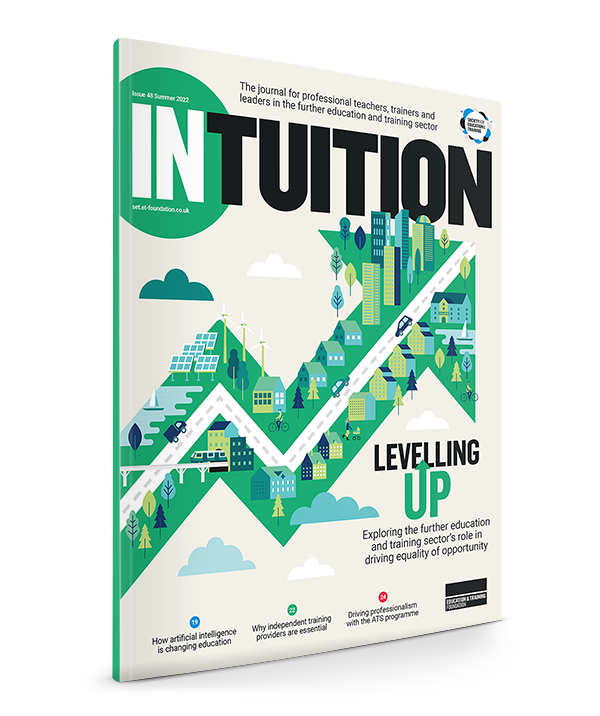inTuition taster: Checking in, not up
I stood in front of the class, ready to teach a lesson I’d spent hours preparing. I made sure it was on the right lesson plan template, providing reams of paperwork to show every decision I had made and why. I was apprehensive of the observation clipboard – grades, checklists and the unspoken need to perform. For years, this scene played out across classrooms, with quality assurance often perceived as a judgement rather than an opportunity for growth.
At Kirklees College, we’re changing the narrative. ‘Checking in, not checking up’ is more than a mantra; it’s the foundation of an approach to quality assurance that prioritises collaboration, reflection and improvement. Our focus has shifted from proving performance to supporting development; we’re building a culture where educators feel empowered, not scrutinised.
For too long, quality assurance has been synonymous with compliance. Graded observations, once standard across the sector, have been criticised for their high-stakes nature and questionable reliability.
In 2015, Dr Matt O’Leary, professor of education at Birmingham City University, described the end of graded inspections as a positive step, although he cautioned that removing grades alone wouldn’t erase the negative associations many educators have with the process. He said that sustainable improvement requires shifting the focus from ‘sorting’ to ‘supporting’ teachers through reflective, developmental approaches.
During the Covid-19 pandemic, many institutions paused traditional practices, discovering that educators could thrive without the constant oversight of graded observations. This realisation led some colleges to abandon the old model entirely, adopting approaches that emphasised trust and autonomy.
Our ethos redefines quality assurance as a supportive, developmental process. At its heart is the belief that teaching excellence grows when educators have the space and trust to reflect on their practice.
We replaced traditional graded observations with ungraded lesson visits. These are collaborative and formative in nature, built on the principles of ‘noticings’ and ‘wonderings’. Instead of evaluating, we explore together: What’s working well? What might be improved? How can we support the teacher’s goals?
One example of this approach was a lesson visit with a new teacher experimenting with group discussions. We noticed the energy and engagement in the room and wondered how slight adjustments to questioning techniques might deepen critical thinking. By focusing on possibilities rather than deficits, the teacher left feeling inspired and eager to refine her approach.
This ethos is part of a broader vision to create a self-improving culture. By reducing the fear associated with observations, we’re helping teachers shift their focus from external validation to internal growth. Lesson visits are no longer about proving competence but exploring potential.
As the perception of the quality team evolves, we’re increasingly seen as allies in development rather than gatekeepers of compliance. Trust is growing and, with it, a willingness to take risks, innovate and push boundaries in teaching and learning.
The benefits of ‘checking in’ extend beyond the classroom. A supportive approach to quality assurance enriches the overall culture of the college. It aligns with broader goals like fostering equity, inclusion and collaboration, ensuring that every educator feels valued and supported in their journey.
Moreover, this ethos complements other professional development initiatives. When educators have the tools and freedom to reflect, they’re better equipped to contribute to a system that values continuous improvement.
By embracing ‘checking in, not checking up’, we’re not just changing how we approach quality assurance but how educators feel about their work. This shift signals trust, respect and a shared commitment to excellence.
The challenge to other institutions is simple: consider what might be possible if we focus on support over scrutiny, on improvement over performance. Together, we can build a culture that values connection, reflection and growth, one lesson at a time.
Kathryn Pogson MSET is teaching, learning and digital innovation manager at Kirklees College.
Views expressed are those of the author and do not necessarily reflect those of SET.

Find out more about inTuition
inTuition is SET’s quarterly professional magazine supporting members' access to CPD resources and the latest sector and research news. It combines sector news with educational research and exciting practical developments and ideas in education and training.
Find out more
